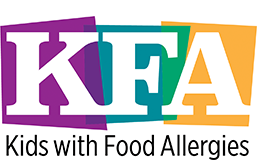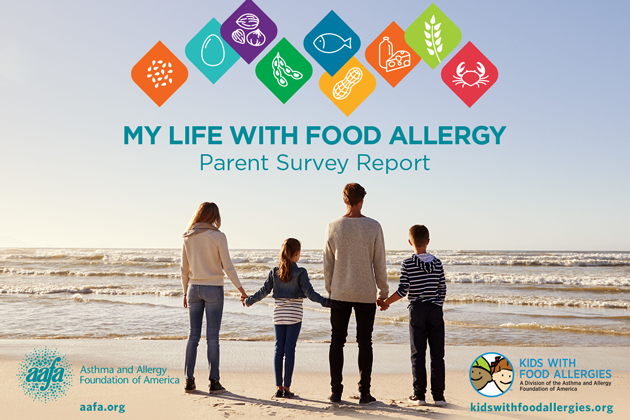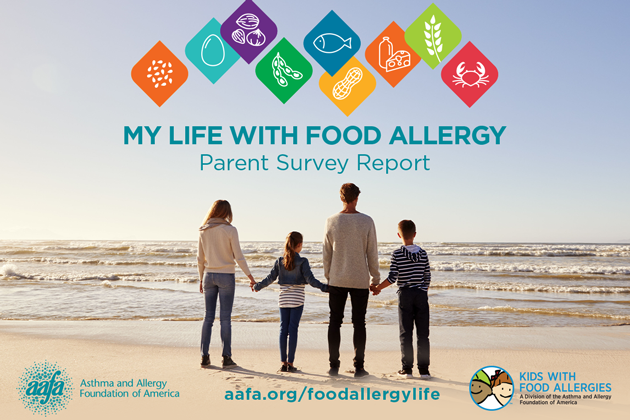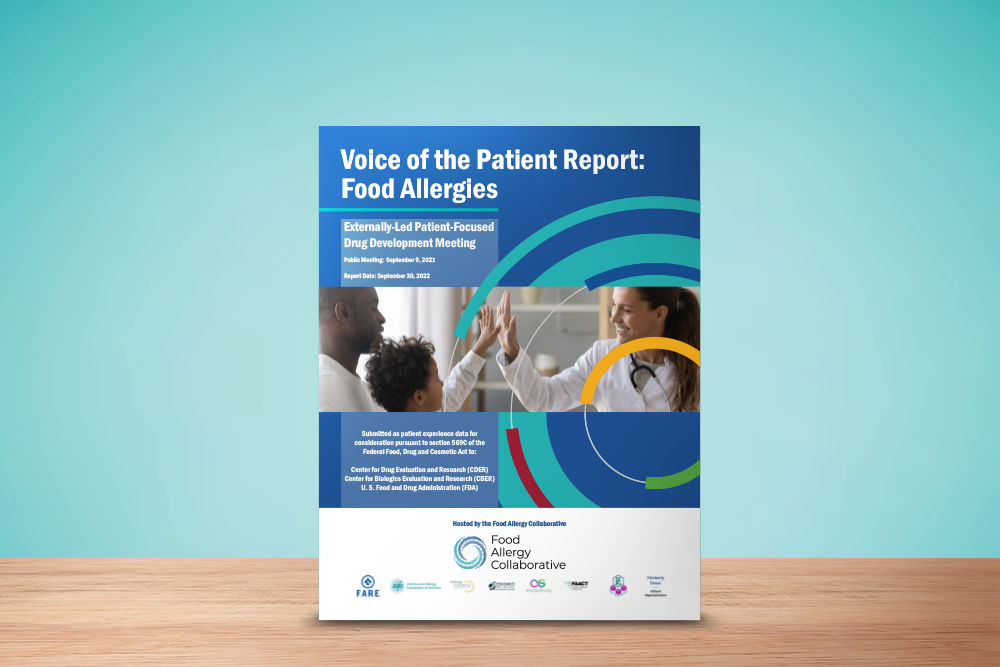Research

My Life With Food Allergy
The public health burden of food allergies (FA) among children in the United States continues to grow. That is why Kids with Food Allergies (KFA) and its parent organization, the Asthma and Allergy Foundation of America (AAFA), are actively involved in food allergy research.
Around 20 million people in the U.S. (4 million children and 16 million adults) have food allergies.1,2 They need better ways to manage it and they need better support.
In 2019, AAFA and KFA, conducted a three-part food allergy study titled, “My Life With Food Allergy.” These surveys from this study aimed to understand the burden of food allergy from three groups:
- Parents of children with food allergies
- Teen/young adult patients with food allergies
- Adults with food allergies
This survey sought insights on the following topics:
- Experience with FA diagnosis, symptoms and allergic reactions, current treatments
- Emotional, social, financial impact of FA on parents and caregivers
- Emotional and social impact on children from the parent’s perspective
- Challenges faced at school, while dining, and at social activities
- Confidence in daily FA management
- Awareness of and thoughts about future treatment
The first report from this study – the My Life With Food Allergy: Parent Survey Report – summarizes the emotional, social, and financial impact on the parent or caregiver of a child with food allergies. This document focuses on select data from the parent survey. In some sections of the report, data from the patient surveys have been included for comparison.
The report analyzed responses from 1,234 parents of children with food allergy, resulting in three key findings.
Key Findings
Due to the breadth of topics covered by the survey, responses provided a great deal of insights into patient and caregiver experiences, beliefs and knowledge. Throughout this report, the most notable data presented will focus on these three key findings:
Mental and emotional impact of food allergy on parents is greater than the impact on the children themselves.
- Parent caregivers report a higher burden than do children age 13 and over.
- FA has a major impact on many parents’ mental, social, and emotional well-being.
- Parents feel a great deal of fear, anxiety, and worry.
Food allergies have major impact on parents’ social lives.
- Families feel like their lives are not “normal” and have to make adjustments in decision making and daily routines.
- Parents skip events, including school functions, due to food allergies.
- Birthday parties, traveling, dining out, and entertainment activities are challenging for parents.
Food allergies cause significant financial strain and time burden for parents.
- For some families, FA can be expensive to manage.
- Some parents have quit work to take care of a child with FA, impacting the entire household.
- FA can also present a major time burden for some families.
Some additional detailed findings from the report include:
- 33% of parents did not feel comfortable asking for help when needed
- 44% say they or their spouse had to make a career choice (such as quitting or changing jobs) in order to care for their child
- 59% felt they could never let their guard down
- 74% said eating out was challenging
- 75% of parents said food allergies give them fear and anxiety
- 82% changed family traditions because of food allergy
- 82% of parents think about food allergies all the time
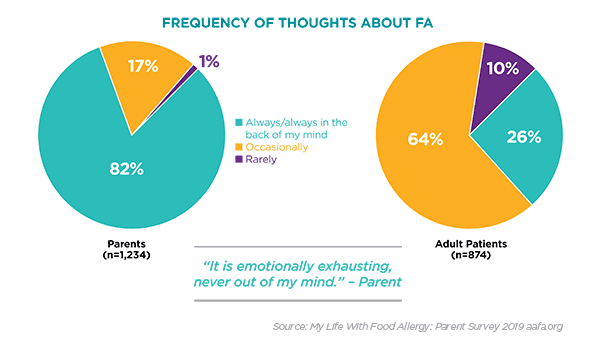 “It is becoming increasingly apparent how food allergies negatively impact the life of not only children and adults with allergies, but also their families and caregivers,” stated Kenneth Mendez, AAFA’s CEO and President. “School social activities, going out to restaurants, birthday parties and Halloween can be fun times for many. But for families living with food allergies, those events can feel like minefields. They must be constantly vigilant to keep their loved ones safe. It is critical for us to utilize our new findings to develop the necessary resources for individuals and families so they can feel more confident and supported.”
“It is becoming increasingly apparent how food allergies negatively impact the life of not only children and adults with allergies, but also their families and caregivers,” stated Kenneth Mendez, AAFA’s CEO and President. “School social activities, going out to restaurants, birthday parties and Halloween can be fun times for many. But for families living with food allergies, those events can feel like minefields. They must be constantly vigilant to keep their loved ones safe. It is critical for us to utilize our new findings to develop the necessary resources for individuals and families so they can feel more confident and supported.”
The parent survey report also identified unmet needs in these areas:
- Emotional and social support
- Education
- Food allergy awareness
- Schools
- Labeling laws and policies
- Financial support
- Research
Spotlight on Eosinophilic Esophagitis (EoE)
Eosinophilic [EE-oh-sin-oh-FILL-ick] esophagitis [uh-sof-uh-JIE-tis] – EoE – is a type of non-IgE mediated food allergy that causes swelling in your esophagus. It can make eating difficult and painful. It can also be tricky and stressful to manage. In our report, we highlighted the effects of managing EoE and the impact it can have on families.
Acknowledgements
The My Life With Food Allergy parent survey is an independent research project of the Asthma and Allergy Foundation of America with support from DBV Technologies.
References
1. Ng, A.E. & Boersma, P. (2023). NCHS Data Brief, no 460: Diagnosed allergic conditions in adults: United States, 2021. National Center for Health Statistics. https://dx.doi.org/10.15620/cdc:122809
2. Zablotsky, B., Black, L.I., & Akinbami, L.J.(2023). NCHS Data Brief, no 459: Diagnosed allergic conditions in children aged 0-17 years: United States, 2021. National Center for Health Statistics. https://dx.doi.org/10.15620/cdc:123250
